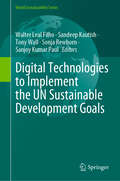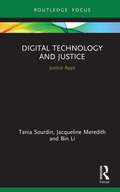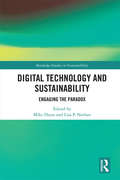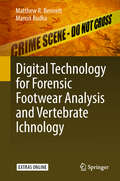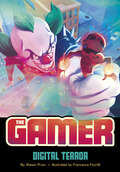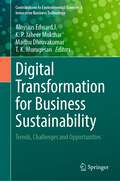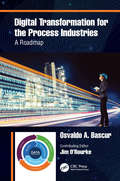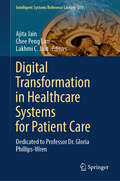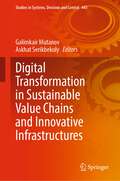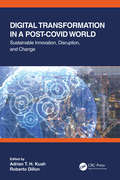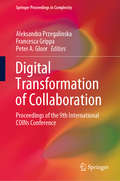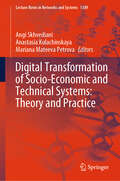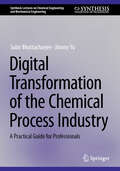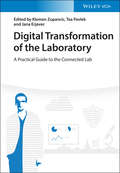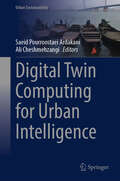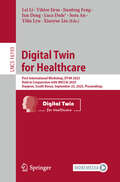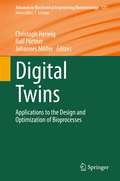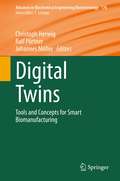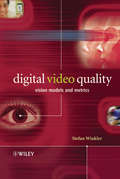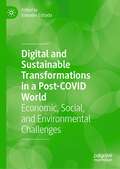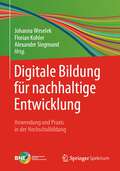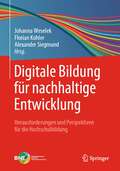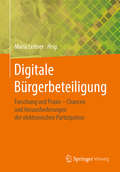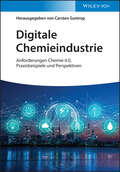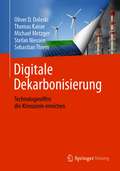- Table View
- List View
Digital Technologies to Implement the UN Sustainable Development Goals (World Sustainability Series)
by Walter Leal Filho Tony Wall Sandeep Kautish Sanjoy Kumar Paul Sonja RewhornAgainst this background, and in order to facilitate a broad discussion on the contribution of IT toward implementing the UN SDGs, this book is being produced. The book gathers inputs from universities, enterprises, and research organizations working on matters related to IT and sustainable development in a variety of contexts. It also provides a platform for the dissemination of information on the latest initiatives, paving the way for technology transfer and networking. Last but not least, a further aim of the book is to present methodological approaches and experiences deriving from case studies and projects, which aims to show how IT may support sustainability efforts in a wide range of settings and contexts. Digital technologies are now widely spread and the variety of tools and methods available today means that they can potentially useful in helping to achieve the United Nations Sustainable Development Goals (UN SDGs). However, the gap between technological innovation and sustainable development applications is quite wide. For instance, it is unclear how artificial intelligence can be leveraged to tackle some of the world’s biggest environmental challenges, including climate change, biodiversity, and water management. Also, there is a need to highlight how innovative green technologies and their applications in areas such as renewable energy, waste management, and sustainable agriculture may be used and to showcase how technological innovation can lead to more sustainable production and consumption patterns.
Digital Technology and Justice: Justice Apps
by Bin Li Tania Sourdin Jacqueline MeredithJustice apps – mobile and web-based programmes that can assist individuals with legal tasks – are being produced, improved, and accessed at an unprecedented rate. These technologies have the potential to reshape the justice system, improve access to justice, and demystify legal institutions. Using artificial intelligence techniques, apps can even facilitate the resolution of common legal disputes. However, these opportunities must be assessed in light of the many challenges associated with app use in the justice sector. These include the digital divide and other accessibility issues; the ethical challenges raised by the dehumanisation of legal processes; and various privacy, security, and confidentiality risks. Surveying the landscape of this emergent industry, this book explores the objectives, opportunities, and challenges presented by apps across all areas of the justice sector. Detailed consideration is also given to the use of justice apps in specific legal contexts, including the family law and criminal law sectors. The first book to engage with justice apps, this book will appeal to a wide range of legal scholars, students, practitioners, and policy-makers.
Digital Technology and Sustainability: Engaging the Paradox (Routledge Studies in Sustainability)
by Mike Hazas Lisa NathanThis book brings together diverse voices from across the field of sustainable human computer interaction (SHCI) to discuss what it means for digital technology to support sustainability and how humans and technology can work together optimally for a more sustainable future. Contemporary digital technologies are hailed by tech companies, governments and academics as leading-edge solutions to the challenges of environmental sustainability; smarter homes, more persuasive technologies, and a robust Internet of Things hold the promise for creating a greener world. Yet, deployments of interactive technologies for such purposes often lead to a paradox: they algorithmically "optimize" heating and lighting of houses without regard to the dynamics of daily life in the home; they can collect and display data that allow us to reflect on energy and emissions, yet the same information can cause us to raise our expectations for comfort and convenience; they might allow us to share best practice for sustainable living through social networking and online communities, yet these same systems further our participation in consumerism and contribute to an ever-greater volume of electronic waste.By acknowledging these paradoxes, this book represents a significant critical inquiry into digital technology’s longer-term impact on ideals of sustainability. Written by an interdisciplinary team of contributors this book will be of great interest to students and scholars of human computer interaction and environmental studies.
Digital Technology for Forensic Footwear Analysis and Vertebrate Ichnology
by Matthew R. Bennett Marcin Budka“There is no branch of detective science which is so important and so much neglected as the art of tracing footsteps. Happily, I have always laid great stress upon it, and much practice has made it second nature to me.” Sherlock Holmes, Study of Scarlet.Despite the fictional nature of Sherlock Holmes this statement rings true today. The study of footwear is neglected in modern forensic practice and does have much to offer. What it needs is an injection of technology and modern analytical tools. These tools are emerging from the digital revolution currently transforming vertebrate ichnology. Ichnology is the discipline of earth science which focuses on the study of trace fossils such as footprints. This book draws upon both disciplines - geology (ichnology) and forensic science - to show how the two have much to learn from each other especially with regard to the digital capture and analysis of footprints. This book presents field and laboratory methods associated with the collection, analysis and presentation of three-dimensional tracks (footprints) whether from a crime scene or a geological/archaeological excavation. It shows students, researchers and practitioners how to collect and analyse 3D data and take advantage of the digital revolution transforming ichnology. This book is not only essential reading for forensic and earth science students but also for professional forensic practitioners as well as for applied computer scientists developing new tools for visualization and analysis of 3D data. The book forms a natural methods focused complement to the successful text Fossilised Locomotion published by Springer 2014.
Digital Terror (The Gamer)
by Shawn PryorCriminal Cynthia Cyber finds the most sinister video game monster and pulls him out of the digital world into reality! As the Terror Beast tears down buildings all over the city and creates nightmares for the citizens, the Gamer must use new strategy to beat his fears and stop Cynthia's latest threat!
Digital Transformation for Business Sustainability: Trends, Challenges and Opportunities (Contributions to Environmental Sciences & Innovative Business Technology)
by K. P. Jaheer Mukthar Aloysius Edward J. Madhu Dhruvakumar T. K. MurugesanThis book explores how digital technologies can be used to drive sustainable business practices and achieve long-term business success. It offers insights and practical strategies and guidance that can help businesses adapt to the digital age, optimize their operations, and create new opportunities for growth. The book further provides real-world examples that illustrate how businesses can leverage digital technologies to achieve long-term sustainability and success. The book is an essential read for business leaders, managers, academician, practitioners and entrepreneurs who are looking to drive sustainable digital transformation within their organizations. The book covers a wide range of topics, including:1) Understanding the digital landscape: The book provides an overview of the digital technologies that are transforming business operations, such as artificial intelligence, cloud computing, and the Internet of Things. It explores how these technologies can be leveraged to create sustainable business practices that benefit both the organization and society.2) Building a digital strategy for sustainability: The book offers guidance on how businesses can develop a digital strategy that aligns with their sustainability goals. It covers topics such as identifying digital opportunities, setting targets, and measuring performance.3) Embedding sustainability into digital operations: The book explores how businesses can integrate sustainability into their digital operations, such as data management, supply chain management, and product design. It provides examples of companies that have successfully implemented sustainable digital practices.4) Digital innovation for sustainability: The book discusses how businesses can use digital innovation to create new opportunities for sustainability. It covers topics such as circular economy business models, sustainable product design, and social innovation.5) Leading for sustainable digital transformation: The book offers insights on how business leaders can drive sustainable digital transformation within their organizations. It covers topics such as leadership skills, organizational culture, and stakeholder engagement.
Digital Transformation for the Process Industries: A Roadmap
by Osvaldo A. BascurImagine if your process manufacturing plants were running so well that your production, safety, environmental, and profitability targets were being met so that your subject matter experts could focus on data-driven business improvements. Through proper use and analysis of your existing operations data, your company can become an industry leader and reward your stakeholders. Written in an engaging and easily understandable manner, this book demonstrates a step-by-step process of how an organization can effectively utilize technology and make the necessary culture changes to achieve operational excellence. You will see how several industry-leading companies have used an effective real-time data infrastructure for mission-critical business use cases. The book also addresses challenges involved, such as effectively integrating operational (OT) data with business (IT) systems to enable a more proactive, predictive management model for a fleet of process plants. Some of the things you will take away: Learn how a real-time data infrastructure enables transformation of raw sensor data into contextualized information for operational insights and business process improvement. Understand how reusing the same operational data for multiple use cases significantly impacts fleet management, profitability, and asset stewardship. See how a simple digital unit template representing production flows can be repeatedly used to identify critical inefficiencies in plant operations. Discover best practices of deploying real-time situational awareness alerts and predictive analytics. Realize how to transform your organization into a data-driven culture for continuous sustainable improvement. Find out how leading companies integrate operations data with business intelligence and predictive analytics tools in a corporate on-premises or cloud-enabled environment. Learn how industry-leading companies have imaginatively used a real-time data infrastructure to improve yields, reduce cycle times, and slash operating costs. This book is targeted for process industries production and operations leadership, senior engineers, IT management, CIOs, and service providers to those industries. Academics will benefit from latest data analysis strategies. This book guides readers to use the best, results-proven approaches to ensure operational excellence.
Digital Transformation in Healthcare Systems for Patient Care: Dedicated to Professor Dr. Gloria Phillips-Wren (Intelligent Systems Reference Library #279)
by Lakhmi C. Jain Chee Peng Lim Ajita JainThis book presents innovative solutions for disease management, elderly care, rehabilitation, surgical decision-making, and health data security. This book explores the transformative impact of Artificial Intelligence (AI), machine learning, and smart technologies on modern healthcare. Addressing wearable devices, digital twins, assistive technologies, and ethical AI implementation, the book highlights how digital advancements enhance diagnostics, treatment personalisation, and patient outcomes. With contributions from leading experts, this collection serves as a vital reference for healthcare professionals, researchers, and policymakers shaping the future of patient-centred, data-driven medicine.
Digital Transformation in Sustainable Value Chains and Innovative Infrastructures (Studies in Systems, Decision and Control #443)
by Galimkair Mutanov Askhat SerikbekulyThis book includes 15 works by scientists of the Eurasian region, which reveal the various stages of the life cycle of digital transformation The creation of value propositions and their distribution chains is important for the sustainable development of society.This view of sustainable value chains on the part of public administration and business, considering modern scientific research, reveals the problems of education and science in the formation of chains sustainability and their infrastructure.Modern views on the actual problems of the digital service in the creation of value propositions with the participation of development institutions, new educational technologies, and state regulation both at the level of the world community and at the level of individual countries are revealed.The problems of digital transformation of economic actors and industries at different stages of the chain of value creation from a position of sustainable development, innovation in the infrastructure of public administration markets are considered.This book is useful to the academic community and a new generation of infrastructure creators to identify vectors to support the innovative development of value chains.
Digital Transformation in a Post-Covid World: Sustainable Innovation, Disruption, and Change
by Roberto Dillon Adrian T. H. KuahThis book explores the innovations, disruptions and changes that are required to adapt in a fast-evolving landscape due to the extraordinary circumstances triggered by the COVID-19 pandemic. Recognized experts from around the world share their research and professional experience on how the working environment, as well as the world around them, have changed due to the pandemic. Chapters consider how different fields across technology and business have been affected by this new, dramatic scenario and the drastic consequences that the pandemic had on them. With diverse contributions stemming from public health, technology strategies, urban planning and sociology to sustainable management, this volume is articulated into four distinct but complementary sections of People, Process, Planet, and Prosperity influencing the post-COVID world. This book will be of great interest to those in the fields of computer science and information technology, as well as those studying the impact and effects that COVID-19 is having on society.
Digital Transformation of Collaboration: Proceedings of the 9th International COINs Conference (Springer Proceedings in Complexity)
by Peter A. Gloor Francesca Grippa Aleksandra PrzegalinskaThis proceedings is focused on the emerging concept of Collaborative Innovation Networks (COINs). COINs are at the core of collaborative knowledge networks, distributed communities taking advantage of the wide connectivity and the support of communication technologies, spanning beyond the organizational perimeter of companies on a global scale. The book presents the refereed conference papers from the 7th International Conference on COINs, October 8-9, 2019, in Warsaw, Poland. It includes papers for both application areas of COINs, (1) optimizing organizational creativity and performance, and (2) discovering and predicting new trends by identifying COINs on the Web through online social media analysis. Papers at COINs19 combine a wide range of interdisciplinary fields such as social network analysis, group dynamics, design and visualization, information systems and the psychology and sociality of collaboration, and intercultural analysis through the lens of online social media. They will cover most recent advances in areas from leadership and collaboration, trend prediction and data mining, to social competence and Internet communication.
Digital Transformation of Socio-Economic and Technical Systems: Theory and Practice (Lecture Notes in Networks and Systems #1309)
by Angi Skhvediani Mariana Mateeva Petrova Anastasia KulachinskayaIn the theoretical field, this book presents innovative concepts and models that elucidate the dynamics and implications of digitalization across diverse socio-economic systems. Additionally, from a practical perspective, the book offers real-world examples and case studies that illustrate successful strategies for implementing digital technologies and their contributions to the sustainable development of various industries. In recent years, digital economy has become a key driver, which fosters growth of various systems. The COVID-19 pandemic has additionally boosted this process and resulted in higher effectiveness of both formal and informal institutes, structural changes on labour market, new opportunities for social mobility, new markets, new forms of interaction between government, individuals, and enterprises. On the other hand, these processes entailed significant challenges among which are digital divide, cyber security, high costs of process digitalization, etc. This book is designed for researchers, educators, students, and practitioners interested in acquiring profound insights into the contemporary processes of digital transformation and their impact on socio-economic and technical systems.
Digital Transformation of the Chemical Process Industry: A Practical Guide for Professionals (Synthesis Lectures on Chemical Engineering and Biochemical Engineering)
by Subir Bhattacharjee Jimmy YuDigital transformation is an approach to improve industrial processes by employing digital technologies. This book describes the steps involved in planning and implementing a digital transformation process of chemical manufacturing organizations. The book emphasizes that implementation of digital solutions requires a combination of information technology and data science and efficient workflows, and often, changes in organizational cultures. Practical guidelines and relevant examples and case studies help clarify the digital transformation approach and in so doing make this book useful.
Digital Transformation of the Laboratory: A Practical Guide to the Connected Lab
by Klemen ZupancicThis practical book in instrumental analytics conveys an overview of important methods of analysis and enables the reader to realistically learn the (principally technology-independent) working techniques the analytical chemist uses to develop methods and conduct validation. What is to be conveyed to the student is the fact that analysts in their capacity as problem-solvers perform services for certain groups of customers, i.e., the solution to the problem should in any case be processed in such a way as to be "fit for purpose". The book presents sixteen experiments in analytical chemistry laboratory courses. They consist of the classical curriculum used at universities and universities of applied sciences with chromatographic procedures, atom spectrometric methods, sensors and special methods (e.g. field flow fractionation, flow injection analysis and N-determination according to Kjeldahl). The carefully chosen combination of theoretical description of the methods of analysis and the detailed instructions given are what characterizes this book. The instructions to the experiments are so detailed that the measurements can, for the most part, be taken without the help of additional literature. The book is complemented with tips for effective literature and database research on the topics of organization and the practical workflow of experiments in analytical laboratory, on the topic of the use of laboratory logs as well as on writing technical reports and grading them (Evaluation Guidelines for Laboratory Experiments). A small introduction to Quality Management, a brief glance at the history of analytical chemistry as well as a detailed appendix on the topic of safety in analytical laboratories and a short introduction to the new system of grading and marking chemicals using the "Globally Harmonized System of Classification and Labelling of Chemicals (GHS)", round off this book. This book is therefore an indispensable workbook for students, internship assistants and lecturers (in the area of chemistry, biotechnology, food technology and environmental technology) in the basic training program of analytics at universities and universities of applied sciences.
Digital Twin Computing for Urban Intelligence (Urban Sustainability)
by Ali Cheshmehzangi Saeid Pourroostaei ArdakaniDigital Twin Computing for Urban Intelligence focuses on new and ongoing discourses in interdisciplinary research and practice in urban system and smart city development pathways. It approaches digital twin fundamentals and principals including theoretical foundations, conceptualisations, strategies and services/patterns to define and adapt digital twin solutions for urban applications - mainly sustainability. This book highlights promising case studies and outlines digital twin design models and system architecture by examining key digital twin deployment practices such as data analysis, decision making, and service automation in the line with intelligent urban planning. It also emphasises on DT technologies such as cloud computing, AI, IoTs, and smart virtualisation and outlines the key benefits of the DT solutions in urban applications - mainly control and planning. This book is intended for a wide range of audiences, including interested layperson audiences, undergraduate and graduate students in university, and researchers. The key benefits of this book are: 1- To introduce the theoretical principles and fundamentals of DT computing for urban intelligence. 2- To present the state-of-the-art DT technologies in urban planning and control. 3- To describe the practical deployment process of DT computing solutions for urban sustainability and intelligence.
Digital Twin for Healthcare: First International Workshop, DT4H 2025, Held in Conjunction with MICCAI 2025, Daejeon, South Korea, September 23, 2025, Proceedings (Lecture Notes in Computer Science #16193)
by Jianfeng Feng Jun Deng Lei Li Viktor Jirsa Luca Dede’ Sora An Yilin Lyu Xiaoyue LiuThis book, LNCS 16193, constitutes the proceedings of the First International Workshop on Digital Twin for Healthcare, DT4H 2025, held in conjunction with MICCAI 2025, in Daejeon, South Korea, during September 23, 2025. The 15 full papers included in the book were carefully reviewed and selected from 24 submissions. They deal with integrating Digital Twin frameworks with conventional medical imaging and computational tools, focusing on topics such as organ- and disease-specific DT modeling; multi-modal data integration; AI-driven simulation and prediction; DT-guided diagnostic and treatment planning; etc.
Digital Twins: Applications to the Design and Optimization of Bioprocesses (Advances in Biochemical Engineering/Biotechnology #177)
by Ralf Pörtner Christoph Herwig Johannes MllerThis is the second of two volumes that together provide an overview of the latest advances in the generation and application of digital twins in bioprocess design and optimization. Both processes have undergone significant changes over the past few decades, moving from data-driven approaches into the 21st-century digitalization of the bioprocess industry. Moreover, the high demand for biotechnological products calls for efficient methods during research and development, as well as during tech transfer and routine manufacturing. In this regard, one promising tool is the use of digital twins, which offer a virtual representation of the bioprocess. They reflect the mechanistics of the biological system and the interactions between process parameters, key performance indicators and product quality attributes in the form of a mathematical process model. Furthermore, digital twins allow us to use computer-aided methods to gain an improved process understanding, to test and plan novel bioprocesses, and to efficiently monitor them. This book focuses on the application of digital twins in various contexts, e.g. computer-aided experimental design, seed train prediction, and lifeline analysis. Covering fundamentals as well as applications, the two volumes offers the ideal introduction to the topic for researchers in academy and industry alike.
Digital Twins: Tools and Concepts for Smart Biomanufacturing (Advances in Biochemical Engineering/Biotechnology #176)
by Ralf Pörtner Christoph Herwig Johannes MllerThis is the first of two volumes that together provide an overview of the latest advances in the generation and application of digital twins in bioprocess design and optimization.Both processes have undergone significant changes over the past few decades, moving from data-driven approaches into the 21st-century digitalization of the bioprocess industry. Moreover, the high demand for biotechnological products calls for efficient methods during research and development, as well as during tech transfer and routine manufacturing. In this regard, one promising tool is the use of digital twins, which offer a virtual representation of the bioprocess. They reflect the mechanistics of the biological system and the interactions between process parameters, key performance indicators and product quality attributes in the form of a mathematical process model. Furthermore, digital twins allow us to use computer-aided methods to gain an improved process understanding, to test and plan novel bioprocesses, and to efficiently monitor them. This book explains the mathematical structure of digital twins, their development and the model’s respective parts, as well as concepts for the knowledge-driven generation and structural variability of digital twins. Covering fundamentals as well as applications, the two volumes offer the ideal introduction to the topic for researchers in academy and industry alike.
Digital Video Quality
by Stefan WinklerVisual quality assessment is an interdisciplinary topic that links image/video processing, psychology and physiology. Many engineers are familiar with the image/video processing; transmission networks side of things but not with the perceptual aspects pertaining to quality. Digital Video Quality first introduces the concepts of human vision and visual quality. Based on these, specific video quality metrics are developed and their design is presented. These metrics are then evaluated and used in a number of applications, including image/video compression, transmission and watermarking.Introduces the concepts of human vision and vision quality.Presents the design and development of specific video quality metrics.Evaluates video quality metrics in the context of image/video compression, transmission and watermarking.Presents tools developed for the analysis of video quality
Digital and Sustainable Transformations in a Post-COVID World: Economic, Social, and Environmental Challenges
by Salvador EstradaCurrent social, economic, and environmental challenges presented by the United Nations’ Sustainable Development Goals may be partially attained by digitalization and sustainable practices diffusion. The antecedents, occurrences, and consequences of this process are currently under investigation, but the big challenge is to get a systemic view. This book attempts to bring such a view into focus.Digital and Sustainable Transformations in a Post-COVID World is dedicated to studying the consequences of the global crisis caused by the COVID-19 pandemic and the new needs and practices inherent in developing and disseminating digital and clean technologies.
Digitale Bildung für nachhaltige Entwicklung: Anwendung und Praxis in der Hochschulbildung
by Johanna Weselek Florian Kohler Alexander SiegmundWie kann digitale Bildung für nachhaltige Entwicklung (BNE) an Universitäten und Hochschulen konkret umgesetzt werden? Wie können Lehrveranstaltungen und Lehr-Lern-Räume gestaltet werden, um Hochschulbildung verstärkt zukunftsfähig zu machen? Wissenschaftler*innen der Natur-, Sozial-, Geistes- und Kulturwissenschaften liefern zahlreiche Beispiele einer praktischen Umsetzung für Hochschullehrende. Vielfältige Impulse werden gesetzt und Möglichkeiten für erfolgreiche Lehr-Lern-Settings vorgestellt – von der Nutzung verschiedener Apps über digitale Experimentierkoffer und Spiele bis hin zu virtuellen Exkursionen. Das breit gestreute Themenspektrum reicht vom Klimawandel und Naturschutz bis hin zu zukunftsorientiertem und diversitätssensiblem Informatikunterricht und der digitalen Transformation in der Fremdsprachendidaktik. Theoretische und praktische Konzepte zeigen die disziplinär und thematisch vielfältige Bandbreite und Beispiele aus der Lehrkräftebildung unterstreichen, welche zentrale Rolle diese für die Gestaltung einer sozial-ökologischen Transformation der Gesellschaft einnehmen. Ziel dieses Buches ist es, über Disziplin- und institutionelle Grenzen hinweg den notwendigen Wandel von Denk- und Handlungsweisen im Kontext einer nachhaltigen Entwicklung zu fördern und eine zukunftsorientierte Hochschulbildung zu gestalten.
Digitale Bildung für nachhaltige Entwicklung: Herausforderungen und Perspektiven für die Hochschulbildung
by Johanna Weselek Florian Kohler Alexander SiegmundWarum brauchen wir eine digitale Bildung für nachhaltige Entwicklung (BNE) an Universitäten und Hochschulen? Wie können Lehr-Lern-Räume zu einer zukunftsgerichteten und zukunftsfähigen Hochschulbildung transformiert werden? Diese und weitere vielfältige Fragen behandeln Wissenschaftler*innen der Natur-, Sozial-, Geistes- und Kulturwissenschaften aus ihren jeweils unterschiedlichen, facheigenen Perspektiven.Das vorliegende Buch gibt Einblicke in die theoretische Auseinandersetzung mit nachhaltigkeitsrelevanten Themen wie Verantwortung, Transformation, Naturverständnis oder Werten und Normen sowie den vielfältigen grundlegenden Herausforderungen und Möglichkeiten einer digitalen Hochschulbildung für nachhaltige Entwicklung. Es bietet eine inhaltliche Breite von Themen einer BNE und stellt Hochschullehrenden verschiedene Anwendungsbereiche und Anknüpfungsmöglichkeiten an die digital geprägte Lebenswelt von Lernenden vor. Kritische Reflexionen veranschaulichen, vor welchen Herausforderungen und Grenzen digitale Hochschullehre im Kontext einer BNE steht.Ziel dieses Buches ist es, über Disziplin- und institutionelle Grenzen hinweg den notwendigen Wandel von Denk- und Handlungsweisen im Kontext einer nachhaltigen Entwicklung zu fördern und eine zukunftsorientierte Hochschulbildung zu gestalten.
Digitale Bürgerbeteiligung: Forschung und Praxis – Chancen und Herausforderungen der elektronischen Partizipation
by Maria LeitnerBürgerbeteiligung, d. h. die Beteiligung der Bürgerinnen und Bürger an politischen Planungsprozessen oder Entscheidungen, wird bereits in Deutschland, Österreich und der Schweiz gefördert und gelebt. In Zeiten der Digitalisierung werden immer häufiger technische Applikationen zur elektronischen Partizipation (E-Partizipation) eingesetzt. Die Nutzung von Technologien bietet Chancen und Herausforderungen gleichermaßen, so zum Beispiel in den Bereichen Sicherheit, Datenschutz und nutzerorientierte Gestaltung. Das Buch greift genau diese Themen im Bereich der E-Partizipation auf und erläutert insbesondere Gestaltungsaspekte der digitalen Bürgerbeteiligung. Es kombiniert aktuelle Forschungsergebnisse mit bestehenden Theorien der E-Partizipation und bietet eine umfassende, interdisziplinäre Analyse aus sozialwissenschaftlicher, rechtlicher und technologischer Perspektive. Schutz der Privatsphäre und Sicherheit sind dabei zentrale Aspekte des Buches, die langfristig das Vertrauen in digitale Bürgerbeteiligung fördern können.
Digitale Chemieindustrie: Anforderungen Chemie 4.0, Praxisbeispiele und Perspektiven
by Carsten SuntropDigitale Chemieindustrie Umfassend und praxisnah bietet dieses Buch alles Wissenswerte zum Thema Digitalisierung in der chemischen Industrie Die chemische Industrie befindet sich derzeit in einem Wandel und steht vor zahlreichen Herausforderungen. Die Digitalisierung spielt dabei eine große Rolle. Sie ist nicht nur der Auslöser für Veränderungen, sondern eröffnet auch neue Wege und Möglichkeiten. Ob in digitalen Geschäftsmodellen, digitalen Prozessen oder für datenbasierte Entscheidungen - die Digitalisierung durchzieht alle Bereiche in der modernen chemischen Industrie. Digitale Chemieindustrie: Anforderungen Chemie 4.0, Praxisbeispiele und Perspektiven bietet einen umfassenden Einblick in die Digitalisierung der chemischen Industrie. Nach einem Überblick über den Status Quo und die Entwicklung der digitalen Chemieindustrie werden zahlreiche Praxisbeispiele aus unterschiedlichen chemischen Unternehmen präsentiert. Abschließend werden Wege für eine erfolgreiche digitale Transformation aufgezeigt. Ob Händler, Mittelständler, Konzerne oder Chemie-/Pharma-Standorte - an dem Thema Digitalisierung kommt keiner vorbei. Geschrieben von führenden Fachleuten aus Industrie, Hochschule und Consulting - jede Sichtweise ist anders und bereichernd. Umfassende Betrachtung der Digitalisierung in der chemischen Industrie - von digitalen Technologien über digitale Geschäftsmodelle bis hin zur digitalen Transformation. Zahlreiche Fallbeispiele aus erster Hand und konkrete Lösungsansätze machen die Thematik für die Leser:innen greifbar. Digitale Chemieindustrie: Anforderungen Chemie 4.0, Praxisbeispiele und Perspektiven ist ein unverzichtbarer Leitfaden für Projektteams und Führungskräfte in der chemisch-pharmazeutischen Industrie, alle Wissenschaftler:innen an Hochschulen sowie Unternehmensberater:innen und Referent:innen, die sich mit der Planung und Umsetzung von digitalen Prozessen in der Chemieindustrie auseinandersetzen.
Digitale Dekarbonisierung: Technologieoffen die Klimaziele erreichen
by Thomas Kaiser Oliver D. Doleski Michael Metzger Stefan Niessen Sebastian ThiemDas Buch liefert erstmals konkrete Antworten auf die Frage, wie datenbasierte Verfahren bei der Dekarbonisierung von Betriebsprozessen helfen können. Der Text beschränkt sich dabei nicht auf die üblichen Ansätze zur Reduzierung klimaschädlicher Treibhausgasemissionen wie bspw. dem Verzicht des Einsatzes fossiler Energieträger. Vielmehr wird in dem Text der pragmatische und vor allem technologieoffene Blick auf die Dekarbonisierung energieintensiver Prozesse oder Verfahren gelenkt und dem Leser ein datenanalytisches Modell zur Optimierung des Energiesystems, welches dann deutlich weniger Treibhausgase emittiert, vorgestellt.
